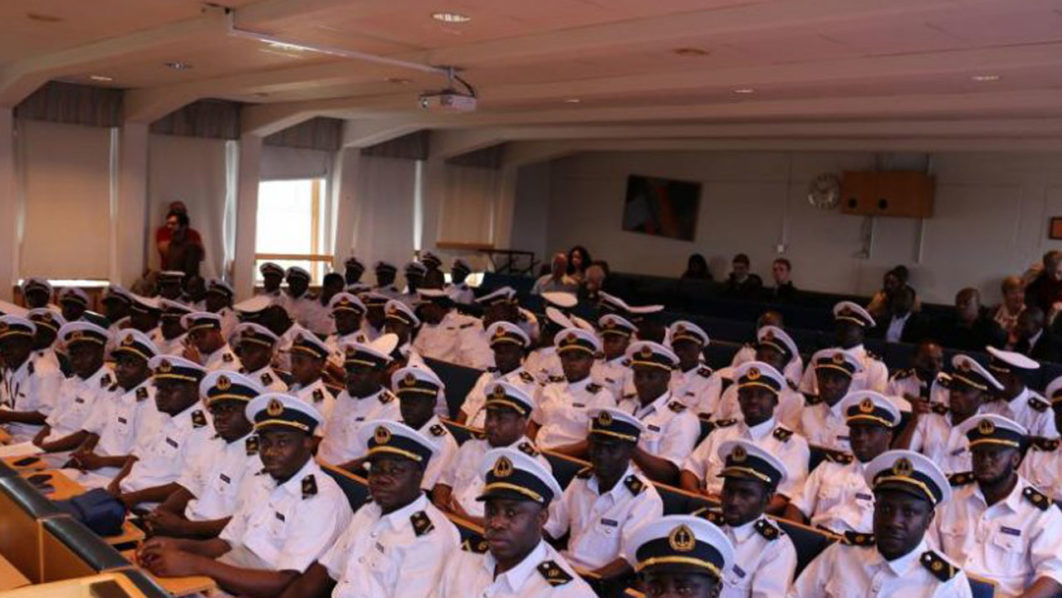The world is in shortage of seafarers, but in Nigeria, there are tens of thousands of them wasting away, with many of them frustrated and sadly, turning to crime on the country’s coast.
Young cadets who have obtained the necessary classroom training at the country’s flagship maritime institution, the Maritime Academy of Nigeria (MAN), Oron, Akwa-Ibom State, the National Seafarers Development Programme (NSDP) or at the various other institutions lack the compulsory sea-time training onboard international sea-going vessels required to become competent seafarers which the world is badly looking for.
The Nigerian Maritime Administration and Safety Agency (NIMASA) is the anchor of the country’s maritime industry, constitutionally charged with developing maritime capacity for both local and export, but the cadets accused the agency of not helping them and instead, frustrating their efforts to get sea-time training on international vessels.
These cadets who are now helpless and frustrated have turned to the social media to voice out their frustrations where their attention was caught by the Maritime Reporters Asociation of Nigeria (MARAN).
During their engagement with MARAN recently, the young seafarers who are mostly cadets trained at the MAN told long tales of all good efforts they had made to secure placement on international vessels but were hindered by bureaucratic bottlenecks at NIMASA and lacklustre attitude of relevant staff of the agency to work.
NIMASA has the responsibility to help the young seafarers get sea-time training, but the agency has left the cadets to their fate. Cadets who dared to make efforts on their own to seek opportunities on international sea-going vessels say NIMASA officials are not helping them with the necessary documents.
Eugene Anote travelled from Warri in Delta State to the NIMASA headquarters in Lagos to obtain his Seafarers Identification Document (SID), after he had secured a placement on an international vessel. He waited for one week before he could get NIMASA’s attention and when he did, he was told by NIMASA officials to call back after three months. He only had one week to resume work on the vessel or lose the opportunity.

The young cadets during an interaction with MARAN to speak about their frustration in getting sea-time training
Narrating his ordeal at the hands of NIMASA officials, Anote said: “When I got the opportunity on an international sea-going vessel, I needed my SID which is issued to cadets by NIMASA. I had quickly visited the NIMASA office in Warri, but I was told that the document is only issued at the headquarters in Lagos. I then tried to raised transport fare from friends and relatives and came to Lagos.
“I had nowhere to stay in Lagos, so I had to stay in a hotel. Unfortunahely, I could not see the officer in charge of the document on the first day I visited the NIMASA headquarters. I had to come again and again and before I could meet the officer, I had spent six days in Lagos and owing at the hotel where I was staying.
“The saddest part of it was that I was told that my status number for the SID was not available and that I should come back after three months. And that was how I lost the opportunity for sea-time training, which I worked so hard to get for myself. Now, my uncle knew someone at the NIMASA office in Warri and when I complained to him, he went to that his friend and got my SID in Warri, but it was too late. I had missed the opportunity.
“Most of our documents are expiring soon. As seafarers, we need several international documents and most of them have short life span. They expire within two or three years and they cost more than N1 million. Many of our colleagues have been frustrated and abandoned their dreams of becoming seafarers after their documents expired.”
Speaking more broadly on the plight of the young seafarers, Cadet Adam Hammed-Saruk said they had reached out to relevant maritime bodies, such Alumni of Maritime Academy of Nigeria, Oron
(AMANO) and the Secretary General the Port State Control for West and Central African Region (Abuja MOU), Capt Sunday Umoren for help, but only got some mentorship.

Minister of Marine and Blue Economy, Adegboyega Oyetola
He said: We have spent years searching for sea time with no success. Many of us have exhausted their resources. They sacrifice financial stability and personal well being to to get all the international papers, but their struggle remains the same. A lot of us have lost hope, and have shut down their maritime aspiration altogether.
“They have endeavored into another thing, be it good, be it bad, but we are here today because we don’t want to be the bad eggs, and because we want the story to change for good. On the internet, we try to attract the attention of foreign shipping lines, foreign professionals and stakeholders to come to our aid, but to no avail. We have thousands of coleagues who graduate 10 years, eight years, seven years, or four years ago but have never set their foot on a vessel till today.”
Hammed-Saruk wondered why a sector that is capable of doubling up the country’s Gross Domestic Product (GDP) from its current status could not attract priority of the government.
“Prompted by this wonder, my research has pinned Singapore as a maritime powerhouse. Annually, Singapore makes sale of bunker fuels of about 47 million tons, which is equal to $24.7 billion. Nigeria makes as annual sale about $1.5 billion which is 6.25% of that of Singapore. Meanwhile, Nigeria’s coastal line is 4.4 times larger than the coastal line of Singapore. For a better perspective, Nigeria is ranked 46th in times of coastal line in the world, while Singapore is ranked 138,” Hammed-Saruk compared.
Another cadet, Paul Adetarami lamented that foreign shipping companies doing business in do not employ Nigerian cadets because NIMASA failed to secure their confidence.
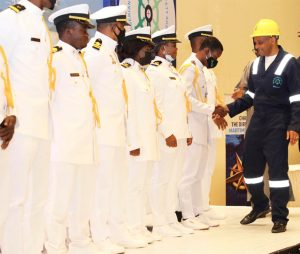
Nigerian cadets trained under NIMASA’s National Seafarers Development Programme (NSDP) in Augist, 2022, still without sea-time experience and not good for the International market. Photo: NIMASA
“Foreign shipping companies don’t take Nigerians. For instance when you want to apply to Maersk, you will not see Nigeria in the list of employable nationals. Yet this company is a big player in Nigeria, repartiating huge profits from Nigeria. This is very unfair and our government must correct this quickly. Nigeria is Maersk biggest African market,” Adetarami noted.
NIMASA keeps mute
NIMASA has refused to speak on the issue. The agency’s spokesman, Mr Edward Osagie ignored all inquiries made to him via emails, text messages and whatsapp on the matter. He also did not pick up calls put to him to respond to the issue.
MARAN President call for state of emergency
The President of MARAN while reacting to the cadets plights called for state of emergency on seafarers sea-time training.
He decried NIMASA’s neglect of young seafarers, lamenting that Nigerian cadets are all over the internet seeking sea-time placements, when maritime administrators of other countries are busy networking on international grounds to find opportunities for their own seafarers and graduates of maritime training institutions.
He said: “Nigeria will soon become a laughing stock in the global maritime industry if urgent steps are not taken by the Ministry of Marine and Blue Economy to address the poor maritime capacity status of the country in the committee of maritime nations.
“It is disheartening that while other nations provides their Cadets with quality identity cards, NIMASA issues Nigerian Cadets identity cards printed on A4 paper. Already, employers are rejecting Nigerian Seafarers due to the lack of proper ID cards. We report with great concern that the unavailability of discharge book is another challenge. Imagine a situation where a company comes along and wants to take Nigerians on foreign going vessel but NIMASA is unable to issue discharge book and the best they can offer is a temporary A4 paper.

Director-General, NIMASA, Dayo Mobereola
“We report that whereas there are so many opportunities in the industry globally for Nigerian cadets, such opportunities never gets to Nigeria owing to worries about our systemic corruption and thus, Nigeria is isolated from the global industry space. We go for conferences or International Maritime Organization, IMO engagements and hardly make any meaningful contributions.
“Nigeria cadets are presently all over the internet begging for sea time space. President Bola Ahmed Tinubu must as a matter of urgency, direct the minister of Marine & Blue Economy NIMASA to commerce record taking of all seafarers seeking sea time placement and also those who have completed their sea time and seeking employment; so that a data base can be created to serve as ready pool of information and reference. The presidency must go further to ensure that the NIMASA Seafarers Data Warehouse is verifiable, dependable, reliable and valid to ensure that foreign bodies coming for them do not get substandard cadets.”
What you should know
There is a severe seafareres shortage plaguing the shipping industry at the global level
According a BIMCO/ICS Seafarers Workforce Report 2023, the world’s merchant fleet will need an additional 89,510 officers by 2026 due to the increasing demand for competent seafarers. Over 80% of global trade is shipped by sea and an estimated 1.8 million seafarers onboard 74,000 merchant ships, but with growing shortages of qualified mariners. Some 18,000 additional officers would need to join each year to meet demand, according to the report.
According to the STCW convention (2017), more than 90 percent of world trade is transported by sea, and seafarers play a crucial role in promoting global trade. The convention which Nigeria is a signatory to, recommends that maritime administrations such as NIMASA, shipping companies, shipowners, ship managers and seafarer organizations, as well as any other concerned entities, do their uttermost to promote a career at sea among young people and to retain existing seafarers in the industry.
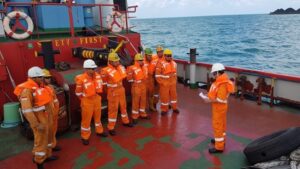
Filipino seafarers contributed over $6 billion to their country’s GDP annually.
While the bulk of Nigerian trained seafarers are languishing, with a few trying to reach out to the International shipping market, Maritime administrators of Egypt, Sri Lanka and South Africa are promoting their cadets to the global shipping world. More than a quarter of the world’s seafarers come from the Philippines. In 2019, an estimated 380,000 Filipino seafarers contributed $6.14 billion to the Philippine economy.
Elsewhere in the world
Seafarers are international labour stores and cannot be adequately harnessed locally. The optimal value of a country’s seafaring capacity is reached when her cadets are employed on international sea-going vessels. Seafarers can contribute a significant portion of a country’s GDP from through repatriation of foreign earnings. For instance,
Elsewhere in the world, relevant maritime agencies and shipping stakeholders are networking at various international maritime fora and reaching out to their counterparts in marketing their pool of seafarers.
Recently, the CEO of German Shipowners Association, Dr. Martin Kroger, twitted about his engagement with Sri Lanka’s minister of Ports, Shipping and Aviation, Mr Nimal Siripala De Silva, where he highlighted the later’s efforts at marketing Sri Lankan seafarers to international shipowners.
He twitted: “My highlight from the Singapore Maritime Week 2024: Amidst a week packed with insightful discussions and one of the worlds best networking opportunities with leaders from the shipping industry and the wider maritime policy world, one of the meetings notably stood out for me.
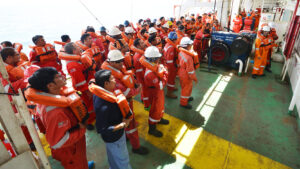
The world is facing shortage of seafarers
“I had the honor of spending a day with Sri Lanka’s Honorable Minister of Ports, Shipping & Aviation, Mr. Nimal Siripala De Silva. We engaged in fruitful discussions on fostering stronger ties between the German shipping industry and Sri Lanka, with a special focus on the recruitment of Sri Lankan seafarers and strengthening gender diversity in shipping.
“Our discussions opened up new avenues for cooperation and for the training and provision of seafarers from Sri Lanka to German shipping.”
What NIMASA should do
Industry pulses indicate that the current management of NIMASA has remained lukewarm and perhaps awaiting a catalyzer from the minister of Marine and Blue Economy. Unfortunately, ministers in Nigeria are political appointees who in most case, merely oversee the agencies activities and report to the president. It beholves on the agencies heads to grab the political will to function optimally and produce the needed change.
Maritime experts adduce that the NIMASA DG will have to embark on series of engagements with the global market to provide sea time training opportunities for Nigerian cadets. He does not need the minister to send him on that mission through paper works. NIMASA is not only Nigeria’s coast guard, with all powers of a port state control, but is also empowered by relevant acts to develop the country’s maritime capacity both on local and international fronts.
NIMASA must begin now to prioritise sea-time training and development, only through which Nigeria’s maritime industry can assure a steady supply of qualified seafarers and mitigate the shame of losing cadets trained under the NSDP and maritime institutions in Nigeria. This labour if properly harnessed, can repatriate multibillion dollars to Nigeria annually and boost maritime contribution to the countrys GDP by 3,000%. The benefits are unimaginably enormous and endless.
A maritime expert, George Uduhe believes NIMASA can get good results with a few years if it is set on a cause to do so. According to him, the NIMASA DG must set on a mission to secure Memorandum of Understanding (MoU) with international shipping lines and partner with them to provide sea-time training and employment for Nigerian seafarers.
He said: “It is very disheartening that international shipping lines doing business in Nigeria and making their biggest profits in Nigeria do not even have an employment window for Nigerian seafarers. NIMASA should start going into partnerships and finding ways to secure MOUs with these shipping lines on sea-time and job provisions for our trained cadets.
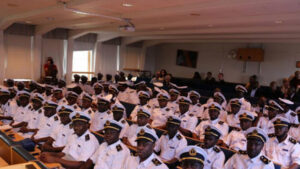
Nigerian seafarers trained without sea-time experience are not employable
“Also, at the IMO, our Certificate of Competence are not recognised and this leaves you with so many questions, but I think everything hoovers around the fact that our cadets don’t have sea-time training. The NIMASA DG must stop ceremonial visits and engagements and open up serious discussions with the IMO on technical and capacity issues.”
ICS Secretary General, Guy Platten asserts: “The Seafarer Workforce report predicts an officer shortage by 2026. To satisfy the future demand for seafarers, the maritime industry must actively promote careers at sea and improve maritime education and training on a global scale, with a focus on the diverse skills required for a greener and more digitally connected industry. This is especially important as we recover from the effects of the pandemic, and we must address the genuine concern that seafarers may abandon their professions in shipping. To ensure that the supply of STCW-certified seafarers continues to meet demand, we must analyse and respond to trends in seafarer retention and continue to monitor the global seafarer workforce on a regular basis.”
Also, NIMASA should begin to build and maintain a reliable data base for maritime labour, both locally and on the global stage.
Secretary General and CEO of BIMCO, David Loosley states: “The Seafarer Workforce Report is not only a useful instrument, but also a necessary one, when it comes to planning for the future and ensuring that the backbone of international commerce has sufficient numbers and skills. The insights and data supplied by shipping companies, national maritime administrations, and maritime education and training institutions for the new report are indispensable for comprehending what our industry must do to prepare for the future of seafarer recruitment and retention.”

